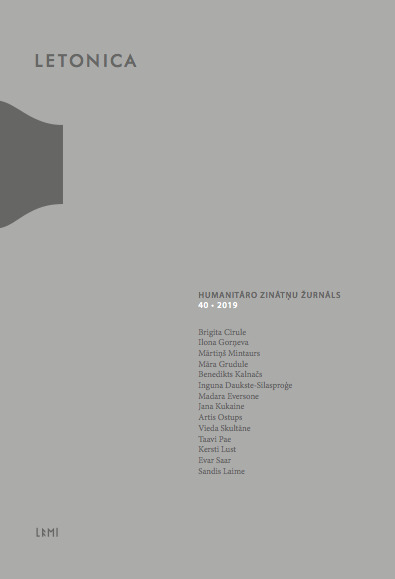Kārļa Skalbes bēgļa ceļš uz Zviedriju: no individuāla pārdzīvojuma līdz kolektīvām atmiņām
Kārlis Skalbe’s Refugee Route to Sweden: From Individual Experience to Collective Memories
Author(s): Inguna Daukste-SilasproģeSubject(s): Cultural history, Latvian Literature, WW II and following years (1940 - 1949), Migration Studies
Published by: Latvijas Universitātes Literatūras, folkloras un mākslas institūts
Keywords: World War II; life of refugees; refugee boats; Sweden;
Summary/Abstract: The article is based on archival material and testimonies of the time and provides an overview of writer Kārlis Skalbe’s (1878–1945) life in a period of approximately 9 months by reconstructing this time of the writer’s life in a historical context. The comparatively short period marks the beginning of Kārlis Skalbe’s life as a refugee at the end of World War II – in August 1944. The period ended on April 1945, when the writer passed away. In terms of the topographical space, several geographical locations are emphasized: Vecpiebalga (leaving the household “Saulrieti”), the road to Riga / through Riga to the coastal area of Kurzeme, the refugee route to Gotland and several months in the vicinity of Stockholm. This comparatively short period of time maps out a wide spectrum of emotions and experiences and resonates within the last literary works of Kārlis Skalbe – especially in his last collection “Zelta lāpa”, which was edited by Jānis Rudzītis (1909–1970) and published in 1946 in Germany after the author’s death. On the one hand, the article focuses on the experience of one writer while being on the path of a refugee. On the other hand, the individual experience obtains a wider context, because it echoes the experience of other refugees, who fled the coastal area of Kurzeme and went to Gotland by a boat, and thus reveals harsh and fatal pages in the history of Latvia and the fate of its people. Kārlis Skalbe reached the foreign country as a refugee and he was one of the many refugees who crossed the sea by a boat. At that time, it did not matter that Kārlis Skalbe was a well-known writer and author of books and compilations and that he played a crucial role in the development of Latvia’s statehood and autonomy. The individual experience of the poet is embedded in a broader historical context – each refugee, who underwent a similar experience, could identify with Kārlis Skalbe’s experience, because they had suffered through the same hardships. Valentīne Lasmane (1916–2018) remembers that the refugees and Kārlis Skalbe in Sweden shared the feeling of being “uninvited guests”. Since fleeing his home and household “Saulrieti”, Kārlis Skalbe only had short-term accommodation on his refugee route. He never found a real home in exile.
Journal: Letonica
- Issue Year: 2019
- Issue No: 40
- Page Range: 61-76
- Page Count: 16
- Language: Latvian

